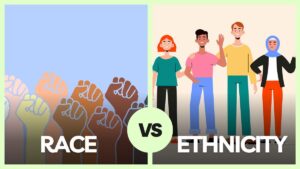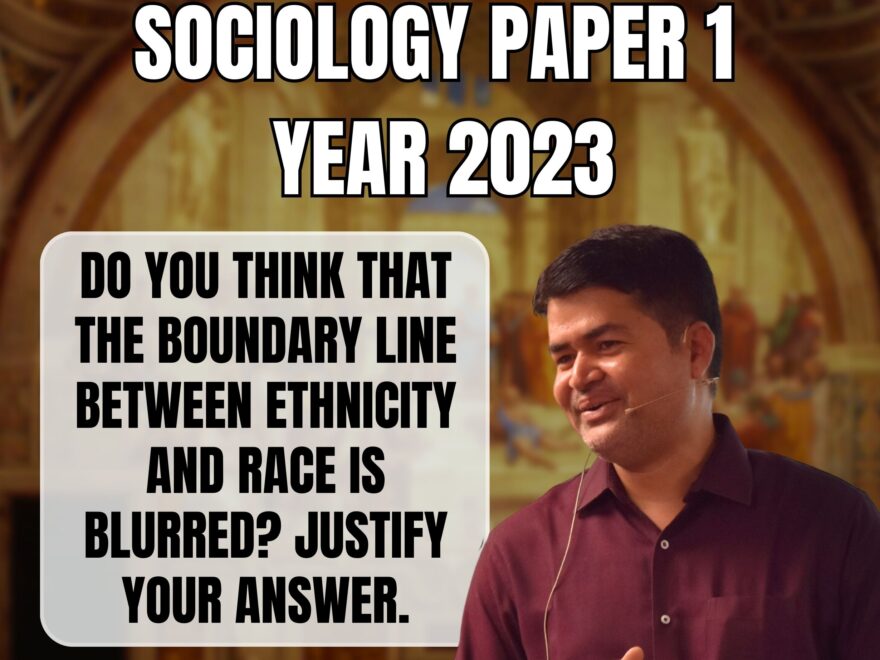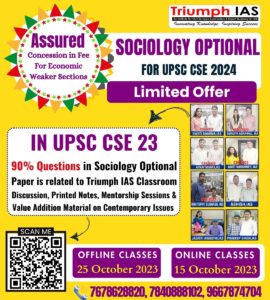Do you think that the boundary line between ethnicity and race is blurred? Justify your answer.
Section: A.
Sociology Paper 2023 Analysis.
Relevant Paper 1: Unit-5 Stratification and Mobility.

Question 1 (D): Do you think that the boundary line between ethnicity and race is blurred? Justify your answer.
(10 Marks)
|
Introduction: Definition of Ethnicity and Race. Main Body: First Highlight the Difference Between the Concepts With Illustration and Then Mention Factors Due to Which the Difference Blurred. Conclusion: On The Lines of Understanding of Such Concepts Becoming Important in Present Context. |
Introduction:
- Race is defined as categorizing individuals and population groups is not based on any biologically valid distinctions between the genetic make-up Racial categorization is frequently (though not always) based on phonotypical differences; that is, differences of facial characteristics, skin colour, and so forth. But these do not correlate with genotypical differences (differences in genetic makeup).
- Eriksen says “Ethnicity is relating to relationships between groups whose members consider themselves distinctive and these groups often ranked hierarchically within society. Ethnicity is based on imputed cultural differences.”
Main body:
Difference between race and ethnicity:
- The ethnicity as a term itself was coined in contradistinction to *race, which is often seen in biological terms. Members of an ethnic group may be identifiable as sharing cultural characteristics such as religion, occupation, language, or politics.
- Race is often associated with physical characteristics, such as skin color, hair type, and facial features. It has historically been used to categorize people based on perceived genetic differences, whereas Ethnicity is more related to cultural and social identity. It encompasses shared customs, traditions, language, religion, and often a sense of belonging to a particular group.
- Oliver C. Cox said that race is recent phenomenon. It could not therefore have origins in universal human sentiments that automatically made ethnic group hostile to one another.
- While there are some genetic variations among human populations, race is primarily a social construct. It is created and defined by society, often leading to racial stereotypes and prejudices. Ethnicity is often fluid and self-identified. Individuals may belong to multiple ethnic groups, and their ethnicity may change over time.
- Ethnicity focuses on cultural practices and values rather than physical attributes. People of the same ethnicity may share cultural traditions even if they have different racial backgrounds.
There are significant differences in classical understanding of race and ethnicity; however the concepts have evolved to have a blurred distinction among them. It can be explained as follows
- Socio-cultural dynamics: Racial and ethnic classifications are influenced by social and cultural factors, leading to a blurring of boundaries. For example, an individual may be racially classified as ‘Black’ but ethnically identify as African American, Afro-Caribbean, or African.
- Historical Context: Historical events, such as colonization, migration, and globalization, have led to the blending of different racial and ethnic groups, resulting in the mixing of identities. This mixing can make it challenging to draw clear lines between race and ethnicity.
- Race rooted in western cultural history: Stephen Sinclair notes that “race” is an extraordinarily problematic debated, reviled and contested so fiercely yet still employed as it is clearly so intrinsically woven into the fabric of western cultural history. This interlinking of cultural history blurs the line of distinction between race and ethnicity.
- Inter-racial relationships and mixed heritage: High rates of intermarriage and the growing number of people with mixed racial and ethnic backgrounds contribute to the blurring of boundaries between race and ethnicity The children of interracial couples, for instance, often experience a “tug-of-war” between their parents’ racial identities, leading to complex and fluid racial identification.
- Subjectivity and ambiguity of race and ethnicity: Race and ethnicity are subjective concepts and inherently ambiguous. People’s self-perceptions of race and ethnicity can change over time and across circumstances, especially among those with heterogeneous ancestries James Manor has highlighted fluidity in character of ethnicity. This fluidity further contributes to the blurring of boundaries between race and ethnicity.
- New racism: Gilory rejected both biological definitions of race and studies of ethnicity that regard ethnic groups as having very strong and distinctive culture that are slow to change. Gilory has highlighted that phenomenon of new racism (propunded by Errole Lawrence) as a struggle in defining the race as new racism put great emphasis on cultural differences. This aspect highlights how racism is interlinked with ethnicity.
-
- For example: The Parekh Report commented that recently Muslim have emerged as the principle focus of racist antagonisms i.e. Islamophobia based on cultural difference hence touching ethnic contours.
Conclusion:
Overt racism becoming taboo in some parts of the world, in other places racially or ethnically motivated wars and even genocide still take place. While it is possible to address some of the problems that cause ethnic conflict and racial hatred, there are still many underlying factors that seem likely to continue to cause such problems for foreseeable future. Hence, the clear understanding of changing dynamics of race and ethnicity hold greater significance.
Related Blogs…
 |
 |

To master these intricacies and fare well in the Sociology Optional Syllabus, aspiring sociologists might benefit from guidance by the Best Sociology Optional Teacher and participation in the Best Sociology Optional Coaching. These avenues provide comprehensive assistance, ensuring a solid understanding of sociology’s diverse methodologies and techniques.
META TAGS:
Ethnicity and Race, Socio-Cultural Dynamics, Historical Context, Mixed Heritage, Race, Ethnicity, Racial Identity, Ethnic Identity, Inter-Racial Relationships, New Racism, Cultural Differences, Stephen Sinclair, Oliver C. Cox, Errole Lawrence, Gilroy, Parekh Report, Muslim, Islamophobia, Genotype, Phenotype, Eriksen, Ethnic Group, Social Construct, Cultural Practices, Subjectivity, Ambiguity, Cultural History, Western Cultural History, Genetic Variations, Blurred Distinction, Sociological Perspectives
Why Vikash Ranjan’s Classes for Sociology?
Proper guidance and assistance are required to learn the skill of interlinking current happenings with the conventional topics. VIKASH RANJAN SIR at TRIUMPH IAS guides students according to the Recent Trends of UPSC, making him the Best Sociology Teacher for Sociology Optional UPSC.
At Triumph IAS, the Best Sociology Optional Coaching platform, we not only provide the best study material and applied classes for Sociology for IAS but also conduct regular assignments and class tests to assess candidates’ writing skills and understanding of the subject.
Choose The Best Sociology Optional Teacher for IAS Preparation?
At the beginning of the journey for Civil Services Examination preparation, many students face a pivotal decision – selecting their optional subject. Questions such as “which optional subject is the best?” and “which optional subject is the most scoring?” frequently come to mind. Choosing the right optional subject, like choosing the best sociology optional teacher, is a subjective yet vital step that requires a thoughtful decision based on facts. A misstep in this crucial decision can indeed prove disastrous.
Ever since the exam pattern was revamped in 2013, the UPSC has eliminated the need for a second optional subject. Now, candidates have to choose only one optional subject for the UPSC Mains, which has two papers of 250 marks each. One of the compelling choices for many has been the sociology optional. However, it’s strongly advised to decide on your optional subject for mains well ahead of time to get sufficient time to complete the syllabus. After all, most students score similarly in General Studies Papers; it’s the score in the optional subject & essay that contributes significantly to the final selection.
“A sound strategy does not rely solely on the popular
Opinion of toppers or famous YouTubers cum teachers.”
It requires understanding one’s ability, interest, and the relevance of the subject, not just for the exam but also for life in general. Hence, when selecting the best sociology teacher, one must consider the usefulness of sociology optional coaching in General Studies, Essay, and Personality Test.
The choice of the optional subject should be based on objective criteria, such as the nature, scope, and size of the syllabus, uniformity and stability in the question pattern, relevance of the syllabic content in daily life in society, and the availability of study material and guidance. For example, choosing the best sociology optional coaching can ensure access to top-quality study materials and experienced teachers. Always remember, the approach of the UPSC optional subject differs from your academic studies of subjects. Therefore, before settling for sociology optional, you need to analyze the syllabus, previous years’ pattern, subject requirements (be it ideal, visionary, numerical, conceptual theoretical), and your comfort level with the subject.
This decision marks a critical point in your UPSC – CSE journey, potentially determining your success in a career in IAS/Civil Services. Therefore, it’s crucial to choose wisely, whether it’s the optional subject or the best sociology optional teacher. Always base your decision on accurate facts, and never let your emotional biases guide your choices. After all, the search for the best sociology optional coaching is about finding the perfect fit for your unique academic needs and aspirations.
Follow us :
🔎 https://www.instagram.com/triumphias
🔎 https://www.youtube.com/c/TriumphIAS
🔎 https://t.me/VikashRanjanSociology
Find More Blogs…
| Compare and contrast Karl Marx’s and Max weber’s | Karl Marx- Historical Materialism |
| Position of Women In the Modern Indian Society | Sociology: Social system and pattern variables |




6 comments